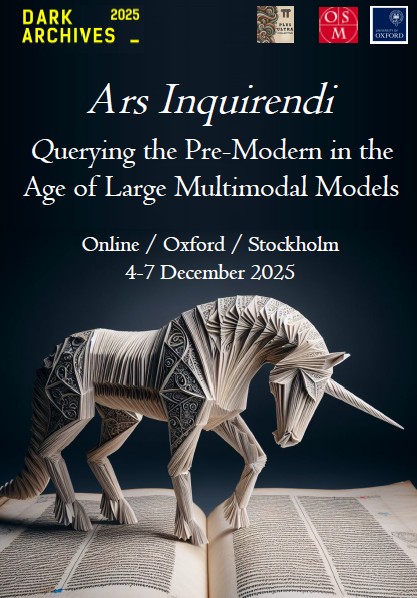Registration Now Open
Register at https://tinyurl.com/arsinq before 30 November 2025
Ars Inquirendi (4–7 December 2025) explores how new AI tools – such as ChatGPT, Claude, and Gemini – are reshaping our understanding of the pre-modern world. Join scholars, technologists, archivists, and newcomers alike for keynotes, panels, and hands-on workshops that show how Large Language Models can help us read, reconstruct, and even simulate the past.
Keynotes
(4 December) Maurizio Forte (Duke University): Rethinking the Past: An AI Perspective in Archaeology
(6 December) Roger Martinez-Davila (University of Colorado, Colorado Springs): When Players Rewrite History: Gameworlds, LMMs, and Alternative Medieval Scenarios
Other confirmed speakers include:
Peter Broadwell (Stanford), Andrew Dunning (Oxford), Mark Faulkner (Trinity College Dublin), Maurizio Forte (Duke), Anthony Harris (Cambridge), Ben Kiessling (École Pratique des Hautes Études), Elisabetta Magnante (Trinity College Dublin), Katherine McDonough (Lancaster), Madeline Rose (Trinity College Dublin), Achim Rabus (Freiburg), Sarah Savant (Aga Khan University), Elaine Treharne (Stanford), Damon Wischik (Cambridge), and Simon Wiles (Stanford).
The conference will run mainly online—talks will be pre-released a week in advance so that live sessions can focus on discussion—though participants are warmly invited to join the in-person workshops at the Stephen A. Schwarzman Centre for the Humanities, Oxford, on 7 December.
****
Online / Oxford, 4-7 December 2025
The advent of Large Multimodal Models such as ChatGPT, Claude and Gemini – humanly conversant but also unpredictable assimilations of collective learning and experience – has opened a remarkable new era in pre-modern studies. How will LMMs transform our understanding of the pre-modern as they re-interpret the sum of its materials – from manuscripts, music, runes, and myriad other artefacts, to existing metadata and the very history of inquiry into the period?

Ars Inquirendi, a multi-day joint conference to be held on 4-7 December 2025 (online, with in-person workshops in Stockholm and Oxford)
invites demonstrations of all aspects of the nascent art of using LMMs to query the pre-modern – by which we mean, broadly, any Old World cultures before their domination by movable-type print – from pre-modernists already using LMMs, and computer scientists building them, to philosophers and historians of knowledge.
Possible Topics
Nuts and bolts of LMMs. What are the steps for non-technical scholars wanting to incorporate these powerful tools into their active research? We especially encourage the sharing of experience with the crafting of LMM queries (‘prompt engineering’), research corpus customisation, and the integration of different technologies to form a research system. The practical, hands-on workshops accompanying the conference will further support scholars new to these tools.
The darkness of the pre-modern archive. Unlike post-print cultures, the overwhelming output of pre-modern scribal cultures remains unscanned, and thus directly inaccessible to LMMs; moreover, machine learning has to date proven unable to transcribe images of manuscripts en masse, and scholarly editions remain trapped behind paywalls. How do these gaps impact LMMs’ utility for pre-modern studies? Are these tools nonetheless becoming capable of direct transcription? Which materials should be prioritised for digitisation? How might published scholarship be made more accessible to LMMs?
Confabulation, simulation, and history. LMMs are already notorious for their hallucinations (or rather ‘confabulations’ as Geoffrey Hinton tells us). Is this aspect of LMMs a danger to knowledge of the pre-modern, especially if LMMs crowd out other modes of inquiry? Is it a gateway to new forms of understanding the past, from simulation of periods, personalities and experiences, to the kind of hyper-comparative Game (‘Glasperlenspiel’) imagined by Hermann Hesse?
The transferrable value of pre-modern Humanities in an LMM-driven era. LMMs consume and are accessed through human narrative and symbolism; we already know that the greater a user’s prowess at narrative, the richer the results. Indeed such discourse has become a psychoanalytic Royal Road into the interiority of LLMs, which is otherwise largely opaque to investigation. What does this new centrality of narrative and symbolic expertise mean for the value of Humanities subjects, in their own right and relative to STEM subjects, in our cultural, economic and technological future?
Presentations for the online conference are to be around 40 minutes in length and pre-recorded. They will be made available via the Oxford Medieval Studies website several days ahead of the live sessions, which will run from 2pm to 6pm GMT, and will be dedicated to related discussion and round-table exchanges. The practical workshops are to be conducted in person at Stockholm and Oxford, to provide hands-on training and direct experience with LMMs and related technologies.
Please email proposals by 30 September 2025 to Dr Stephen Pink at arsinquirendi@gmail.com
